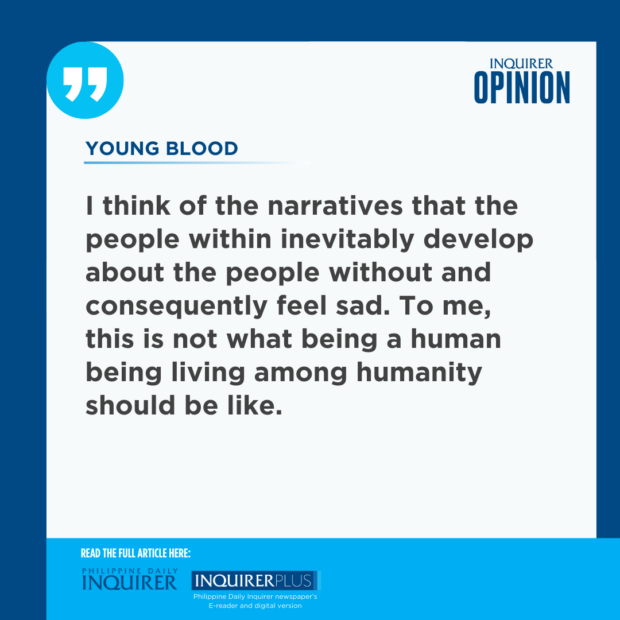Malaise within gated communities

There’s a famous allegorical story by the late essayist David Foster Wallace where two fictitious fish in the ocean have a strange conversation. One of them asks the other how the water feels, which prompts the other to ask the revealing question, “What the hell is water?” In other words, if you’ve grown up knowing only one way of existence, the possibility of existing without it is completely alien to you. So it was with me and gated communities—or “subdivisions,” as they are known in Philippine English.
Ever since I was a young boy, I have spent many occasions within gated communities—and always as a welcome guest, if not a regular visitor. Being in such a privileged position, I used to think nothing of them. But as an adult who’s been through what I’ve been through, I now feel a sense of discomfort and alienation within me whenever I go to a gated community. Or even think of one, as I am doing now.
For those readers not familiar with what a gated community is, a gated community is what the name implies; a community protected by a gate, armed guards, and walls. For proponents of such communities, the benefit of safety is obvious; said exclusionary measures keep drug users and would-be thieves at bay. And for the longest time, that benefit was enough explanation for me. In other words, I never had any reason to question their existence. I was content to just participate in whatever social occasion was at hand without thinking.
It wasn’t until I studied a Filipino poem in my college years that this peaceful, unthinking bubble was shattered. I can’t remember the poem’s title, but it commented on the gated community from the perspective of someone from the outside—that by keeping a privileged few in, said community kept many others out. That poem forced me to confront how gated communities would look from the perspective of someone from the outside.
In the years between then and now, I have met several proponents of gated communities, and they’ve all used the same argument—that gated communities keep residents safe from drugs and crime on the outside. But that raises the question of why the supposedly dangerous and thus excluded people outside resort to drugs and crime in the first place. Social science is not neutral on this subject; overwhelmingly, these people turn to such a lifestyle to escape poor economic conditions.
And as the scholarly work of, among others, academic Dr. Roy Maconachie shows, gated communities exacerbate poor economic conditions, reinforcing the system that creates the excluded individuals. In other words, gated communities play an active hand in creating and perpetuating the problems that they seek to address in the first place.
Part of the problem, as Dr. Setha Low describes in her own extensive research on the subject, is that the dangerous people aren’t thought of as full “people” by this system of gated communities, but instead as problems to be solved. To use the language of sociology, they are “othered” by this housing system—considered just problems to be excluded, not people with their own reasons for behaving in destructive and erratic manners. Once that in-group/out-group distinction is established, objectifying and dehumanizing behavior of the out-group by the in-group becomes easier.
But the blame can’t solely be placed on individual bad actors or even individual governmental administrations. The problem here is the system: a system of exclusionary housing that, regardless of its admittedly legitimate concerns, reinforces the unequal and unjust living conditions of the people excluded. As previously mentioned, those living conditions in turn reinforce the behaviors that lead to said concerns in the first place.
Now, whenever I’m in a gated community, I feel a deep sense of unease and discomfort. As the scholarly work of both academics also reveals, gated communities don’t just cause adverse economic conditions, they also erode the sense of community within the areas they are situated in. I think of the narratives that the people within inevitably develop about the people without and consequently feel sad. To me, this is not what being a human being living among humanity should be like.
I’ll be the first to admit that while this housing system is a problem, I don’t know the solution to it. After all, it isn’t ethical to stop people from living wherever they want to live. Problems and solutions of this scale tend to be complicated. But as the local academic and columnist Dr. Gideon Lasco said while writing on the same subject: “If we want to be a nation, we need to build more bridges and less walls.”
—————-
Alfonso Divinagracia, 26, is a freelance journalist and writer based in Manila. He is taking up graduate studies at the University of the Philippines Diliman.




















